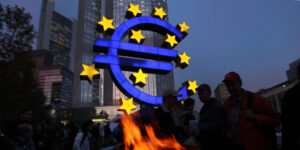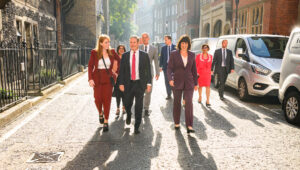For much of the Merkel era, Germany stood as an island of economic and political stability amid Europe’s perennially stormy waters. Those days, however, seem like a distant memory. Europe is still in crisis — but now Germany is the epicentre. It is, once again, the sick man of Europe.
Anti-government demonstrations are rare in Germany. So when hundreds of angry farmers and their tractors descended on Berlin in mid-December, to protest a planned cut to diesel subsidies and tax breaks for agricultural vehicles as part of a new wave of austerity measures, it was clear that something was afoot. The government, evidently concerned, immediately backtracked, announcing that the discount would remain in place, and that the diesel subsidy would be phased out over several years instead of being abolished immediately. The farmers, however, said it wasn’t enough — and threatened to step up the protests unless the government completely reserved its plans.
They were true to their word: in the weeks that followed, thousands of farmers staged massive protests, not just in Berlin but in several cities, even blocking the arterial autobahns, and effectively bringing the country to a standstill. The government, in turn, resorted to one of the oldest and most effective tricks in the political playbook: claiming the far-Right were behind the protests in an attempt to delegitimise the farmers and scare people away. Except that, this time, it didn’t work. Not only did the protests continue, they grew, and even attracted workers from other industries — fishing, logistics, hospitality, road transport, supermarkets — as well as ordinary citizens.
As a result, what started as a protest over diesel subsidies has evolved into a much wider revolt against the German government. One of the most common slogans at the demonstrations is: “The traffic light must go!”, a reference to the governing coalition of the Social Democrats, the Free Democrats and Greens. And, much like the Gilets Jaunes in 2018, whose own protests were triggered by fuel prices, the farmers have given voice to a much greater pool of political anger.
As one told the Washington Post: “Originally, we had hoped that the cuts to the agriculture subsidies would be overturned. But… I think it’s clear that this protest is about a lot more. Not only us farmers are unhappy, but other areas, too. Because what’s coming out of Berlin is damaging our county — especially the economy.” Even this approaches euphemism: soaring living costs, plummeting real wages, massive layoffs and a burgeoning housing crisis have sent approval ratings for Scholz’s government to record lows — and Germans are getting restless.
Aside from the farmers’ protests, over the past month the country has been beset by some of its largest strikes in decades: train drivers, local public transit workers, airport security personnel, doctors and retail workers, all demanding higher wages and better working conditions. Further industrial action is expected in the coming weeks. This is particularly astonishing considering that Germany has long prided itself on its non-conflictual model of industrial relations, which has historically emphasised co-operation between trade unions and employers’ federations.
The problem is that Germany’s social peace was premised on an economic model — the once-hailed Modell Deutschland — that is all but bust. Its economic success in the 21st century was founded on two pillars: cheap imports of raw materials and energy (especially from Russia) and high demand in the rest of the world. Over the past few years, though, thanks to a global slowdown and the Ukraine war, both have been tumbled away. Germany was the worst-performing major economy in the world last year according to the IMF, and the country is now teetering on the brink of recession. Industrial production has fallen five months in a row: as Hans-Jürgen Völz (chief economist for the BVMV, which lobbies on behalf of small- and medium-sized businesses) said last July: “One sometimes hears about ‘creeping deindustrialisation’ — well, it’s not just creeping anymore.”
What’s striking is that the German leadership has largely brought this crisis on itself. First, it leapt on the anti-Russian bandwagon and decoupled from its main source of energy; and then it compounded the crisis via two of the German establishment’s favourite obsessions, green policies and austerity. The proposal to scrap fuel subsidies is a perfect case in point. It emerged from a court ruling that the government’s attempt to bypass its own fiscal rules by turning €60 billion originally earmarked for Covid aid towards measures aimed at combating climate change was unconstitutional. The decision to cut the subsidies was thus presented by the government as the only way to meet both its fiscal and climate targets. The message was one that we’ve become accustomed to: “es gibt keine Alternative [There is no alternative].”
But of course, both of those targets are self-imposed. They are the result of political decisions, not laws of nature — something ordinary Germans are more than aware of. They are no longer willing to accept politics mediated by such false binaries, a tactic too-often deployed in order to insulate unpopular policies from political contestation. Indeed, the protestors are already turning that logic on its head. As Martin Häusling, an organic farmer and a member of the German Green Party (which has, unusually, backed the farmers’ protests) told FAZ: “There is no alternative for farmers to driving a diesel tractor. There are no electric tractors yet.”
The voices calling into question Germany’s so-called “debt brake”, a law enshrined in its constitution in 2009 to restrict budget deficits, are also growing. It is becoming increasingly apparent that these self-imposed austerity rules are preventing the government from making badly needed investments in public infrastructure, from schools and public administration to railways and energy networks — as well as, paradoxically, hindering the investments needed to meet the government’s own emissions-reduction targets. As Monika Schnitzer, the head of the German Council of Economic Experts, put it: “Nobody thought it through to the end about what [these rules] could mean in a serious crisis, that there is not enough room to manoeuvre”.
Overall, then, the German model appears to be collapsing under the weight of its own internal contradictions. But these have been building for a long time. Contrary to popular belief, Germany’s post-euro export success was not based on the greater productivity or efficiency of the German economy, but on a series of neoliberal “structural reforms” implemented in the early 2000s that enabled companies to engage in drastic wage compression. This, coupled with the structural underappreciation of the “German euro”, allowed Germany to dramatically increase its competitiveness compared to its European trading partners — and consolidate its hegemonic policy of domination on the European stage.
But it also came at a high social and economic cost: lagging domestic demand, chronic underinvestment, ailing infrastructure, but most importantly in terms of its political consequences, a massive redistribution of national income from wages to profits, resulting in a growing subclass of precarious, low-paid workers. As I wrote a decade ago: “Germany’s export-led model isn’t simply unsustainable in the long run — it has been failing all along.”
However, so long as the economy was growing — and Angela Merkel was there to provide her stern but motherly guidance to the country, while projecting German power on the European and global stage — all this could be swept under the carpet. Until it couldn’t.
It’s important to note that this is more than just an economic crisis for Germany; it’s an existential one. Germany’s self-perception as an economic and geopolitical power is very much part of its national identity — what Hans Kundnani dubbed “Exportnationalismus”, founded upon the belief that Germany’s economic success was a sort of manifest destiny. But the country’s geopolitical fall from grace — from a “Fourth Reich”, as a controversial 2015 Der Spiegel editorial put it, to America’s vassal-in-chief under Scholz — has shattered that belief as well.
This is evident in the surge of anti-establishment “populist” parties on both Right and Left. The AfD has been riding a wave of success for some time, and the latest polls put them in second place nationwide. But new parties are popping up as well, breaking apart the previously stable spectrum of parties. The national-conservative group Values Union recently announced its intention to found a new political party, while Sahra Wagenknecht’s Left-populist response to the AfD is also polling strongly. Though these parties have different guiding philosophies, to varying degrees they all aim to capitalise on a widespread frustration about the economy, immigration, the European Union and the delivery of weapons to Ukraine — and the general mounting hostility towards the ruling coalition.
The German establishment, but also more moderate-leaning Germans, are reacting to the latest populist uprising in typically outraged fashion. Following reports that senior members of the AfD discussed a “master plan” for the mass deportation of German asylum-seekers and citizens of foreign origin during a meeting late last year, massive anti-AfD protests have swept the country — though this doesn’t seem to have dented support for the party.
There have also been calls from politicians and media outlets to ban the AfD — a move that is apparently supported by nearly half of the German public. It goes without saying that attempting to outlaw the country’s second-most popular party wouldn’t just be appalling from a democratic perspective, but would also have unexpected and far-reaching consequences — potentially pushing the country from a fraught political situation towards a state of civic violence.
Amid the surging popularity of Right-populist parties across the continent, Europe would do well to watch its former lynchpin closely. As the saying goes, when Germany sneezes, Europe catches a cold — and this political malady is unlikely to be cured soon.
Disclaimer
Some of the posts we share are controversial and we do not necessarily agree with them in the whole extend. Sometimes we agree with the content or part of it but we do not agree with the narration or language. Nevertheless we find them somehow interesting, valuable and/or informative or we share them, because we strongly believe in freedom of speech, free press and journalism. We strongly encourage you to have a critical approach to all the content, do your own research and analysis to build your own opinion.
We would be glad to have your feedback.
Source: UnHerd Read the original article here: https://unherd.com/




